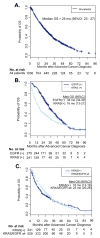Association of KRAS and EGFR mutations with survival in patients with advanced lung adenocarcinomas
- PMID: 22810899
- PMCID: PMC3966555
- DOI: 10.1002/cncr.27730
Association of KRAS and EGFR mutations with survival in patients with advanced lung adenocarcinomas
Abstract
Background: Lung adenocarcinomas can be distinguished by identifying mutated driver oncogenes, including epidermal growth factor receptor (EGFR) and KRAS. Mutations in EGFR are associated with both improved survival as well as response to treatment with erlotinib and gefitinib. However, the prognostic significance of KRAS has not been evaluated in large numbers of patients and remains controversial. For the current report, the authors examined the association of EGFR and KRAS mutations with survival among patients with advanced lung adenocarcinomas.
Methods: Data were analyzed from patients with advanced lung adenocarcinomas who had known EGFR and KRAS mutation status evaluated between 2002 and 2009. The collected clinical variables included age, sex, Karnofsky performance status, smoking history, and treatment history. Overall survival from the diagnosis of advanced disease was analyzed using Kaplan-Meier and Cox proportional hazard methods.
Results: In total, 1036 patients were evaluated, including 610 women (59%) and 344 never-smokers (33%). The median patient age was 65 years (range, 25-92 years), and the majority of patients (81%) had a Karnofsky performance status ≥80%. In multivariate analysis, EGFR mutations were associated with longer overall survival (hazard ratio, 0.6; P < .001), and KRAS mutations were associated with shorter survival (hazard ratio, 1.21; P = .048).
Conclusions: KRAS mutations predicted shorter survival for patients with advanced lung adenocarcinomas. The presence of EGFR and KRAS mutations define distinct subsets of patients with lung adenocarcinomas and should be determined in patients when they are diagnosed with advanced disease. Clinical trial reports should include EGFR and KRAS mutation status along with other prognostic factors.
Copyright © 2012 American Cancer Society.
Figures

References
-
- Lynch TJ, Bell DW, Sordella R, et al. Activating mutations in the epidermal growth factor receptor underlying responsiveness of non-small-cell lung cancer to gefitinib. N Engl J Med. 2004;350(21):2129–2139. - PubMed
-
- Paez JG, Janne PA, Lee JC, et al. EGFR mutations in lung cancer: correlation with clinical response to gefitinib therapy. Science. 2004;304(5676):1497–1500. - PubMed
-
- Mok TS, Wu YL, Thongprasert S, et al. Gefitinib or carboplatin-paclitaxel in pulmonary adenocarcinoma. N Engl J Med. 2009;361(10):947–957. - PubMed
-
- Slebos RJ, Kibbelaar RE, Dalesio O, et al. K-ras oncogene activation as a prognostic marker in adenocarcinoma of the lung. N Engl J Med. 1990;323(9):561–565. - PubMed
MeSH terms
Substances
Grants and funding
LinkOut - more resources
Full Text Sources
Other Literature Sources
Medical
Research Materials
Miscellaneous

